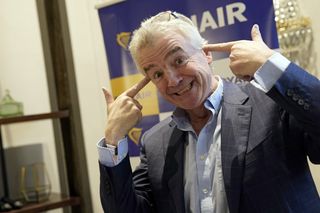Gene Kerrigan: Ah, look at the smile on the lovely baby
Campaigns are not about facts, truth or reality - they're about getting your vote, writes Gene Kerrigan
Bruce Arnold
Social conservatives don't get sufficient credit. When it comes to campaigning, they have a genuine skill for effective phrase-making - as we're seeing in their current anti-equality campaign.
So effective are the No side that those in favour of marriage equality complain about their slogans and posters. Their posters confuse the issue, we're told; it's negative and nasty campaigning and it's not fair.
Let's stop whinging. We're all adults, and we know the reality of campaigning.
Campaigns are not about debate; they're not about a reasoned assessment of the issues. Whether in an election or a referendum, the point of a campaign is to convince people to vote for your side. Full stop.
That's not the way things should be, but it's the way it is.
The 2011 General Election, for example - you're Labour and the polls say Fine Gael is gaining ground. So, you publish anti-Fine Gael adverts. And you jump up and down and say you're against water charges; you say you'll protect child benefit; and you stage a stunt for the cameras in which you solemnly sign a pledge to oppose a rise in student fees.
And such pledges are enough to get you over the line and into Government. At which stage, you impose water charges, cut child benefit and raise student fees.
What you said while campaigning applied during the campaign. It had a specific purpose and had nothing to do with what happens after the election.
In the current campaign, the anti-equality side recognises reality and goes for the jugular.
On a poster, a baby smiles happily, being kissed on one cheek by a man and on the other cheek by a woman. Slogan: "Children deserve a mother and a father - Vote No".
What a simple, effective concept! If you don't vote No you'll tear this mammy out of this baby's life!
Yes, it's deceptive, but it works.
In 1995, the anti-equality people summed up their opposition to divorce in a striking phrase: "Hello Divorce . . . Bye Bye Daddy."
The slogan presented a bleak view of marriage. In Ireland, it suggested, we find marriage so constricting and repulsive that we need constitutional chains to force people to stay together.
And the right-wing's view of men was equally dismal. Without constitutional chains binding us to our wives and our children, we would, at the first opportunity, skip merrily off into perpetual promiscuity.
The Left laughed at the crudeness of this. And complained that it was deceptive. But that poster and others like it came within half of 1pc of defeating the divorce proposal a second time.
Yes, the poster was primitive - it whispered to women: "Vote No or he'll leave you." And it presented a depressing view of marriage. But it reflected something in the underlying economic and social relations between women and men at that time - and it stirred fears, and it worked.
Twenty years later, people are comfortable with divorce - we know it doesn't break up marriages, it's a means of formally ending a relationship that is irretrievably broken.
Today, the anti-equality posters are more sophisticated. They play on our sense of guilt, rather than our fears. They suggest that in our eagerness to treat gay people fairly we risk damaging babies, by depriving them of a mother or father.
You might say: "Hello equality . . . Bye Bye Daddy and Mammy."
Now, under the law, I can adopt a child, once I have been assessed and deemed suitable. If I'm suitable, my personal circumstances don't matter.
Most people are fine with this. They'd say that what matters is that the child be raised with love. They'd say that what matters is the commitment of the parent.
So, I can adopt, and it doesn't matter if I'm married or single, gay or straight, living with someone - man or woman - or living alone.
The fact is, in every circumstance, other than me being married to a woman, that child will be deprived of a mammy.
If a woman does the adopting, in every circumstance other than her being married to a man, that child will be deprived of a daddy. With a single woman - whether gay or straight, a widow, divorced or single - raising a child means goodbye daddy.
That is how things stand, under law. It's a recognition that there's no single or ideal form of parenting. It is how things will stand after the marriage equality referendum on May 22 - no matter which side wins.
Children will be adopted, children will be born through surrogacy. Just as they are now - whether Yes wins and gays are free to marry; or No wins and the inequality continues.
The anti-equality side doesn't propose we wrench adopted children away from single women.
Why, then, have children been brought into this debate?
Because this isn't a debate, it's a campaign. And campaigns are solely about winning votes.
The function of the campaign, from the anti-equality side, is to deny gay people equality.
But that seems a bit mean - and since gay people are our children and the children of our relatives, friends and neighbours, "Vote Against Equality" would be an ineffective slogan.
So, you put a lovely baby on a poster - you point a metaphorical gun at the baby's head, and you say: "Vote No or the kid gets it", or words to that effect.
You have to admit - Vote No or you're depriving this kid of a mammy is one hell of a slogan. What matters is what works.
There is, in the current campaign, an exception to this cynical approach. And it's named Bruce Arnold.
Bruce has been a presence on the journalistic scene as long as I can remember. I often disagreed with what he wrote, but his ability to argue and his sincerity have never been in doubt. It was a bit of a coup to have a cultured, thoughtful man weigh in on the side of inequality.
Bruce has no slick slogans, he has massive documents, arguments and studies. He doesn't hide behind cute kiddies, he says what he means.
Bruce writes of "the primal human need to imprint upon time a bloodline that was unique"; of how "the magical mystery of marriage and family will continue the bloodline".
For Bruce, marriage "requires the procreative element at least potentially in order to grow and enrich human beings within nature. Nothing else will do."
His form of marriage cannot be compared to a "form of marriage which is not open to birth and procreation, nor with a form of marriage that is reliant on adoption, nor on fostering, nor on any other form of family expansion, however precious or well-meaning, since that will always remain a clearly different thing."
These are short quotes from Bruce's lengthy argument. It was published in the The Irish Times on February 12 of this year, and it's worth reading, to understand the depth of feeling behind the anti-equality case.
So, we have two approaches to promoting inequality. A densely argued treatise about bloodlines and the need for marriage to be "open to birth and procreation".
And, on the other hand, charming posters with grinning babies. The grinning babies people are careful not to promote Bruce's output, perhaps for fear of driving away those who have adopted or fostered children, those unable to "procreate" or those who simply believe that such arguments aren't worthy of consideration.
Nor, of course, do the grinning babies people distance themselves from Bruce; for he speaks honestly - if, for them, too openly - of the thinking behind the anti-equality campaign.
Join the Irish Independent WhatsApp channel
Stay up to date with all the latest news














